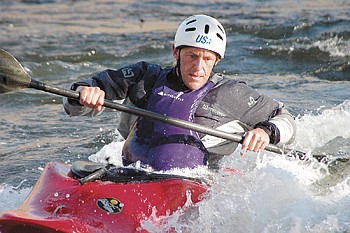In 1992, Joe Jacobi won Olympic gold with Scott Strausbaugh in whitewater canoe slalom in Barcelona. It was the highlight of his competitive career in whitewater canoe and kayak, but it certainly wasn't the end of his involvement with competitive canoeing and kayaking.
Over the years, Jacobi has worked as a coach, broadcaster for whitewater events and as a member of the USA Canoe/Kayak board of directors.
Last week, the Ducktown, Tenn., resident began the latest phase of his life when his was named CEO of USA Canoe/Kayak, which promotes canoe and kayak racing and is the Olympic governing body for the sport in the United States.
Despite the extensive travel to U.S. training centers in Charlotte, N.C., and Oklahoma City, Jacobi, his wife, Lisa, and daughter, Séu Jane, plan to maintain their home in Southeast Tennessee
While spending time at the U.S. Olympic Training Center in Colorado Springs this week, Jacobi took time to answer a few questions about canoeing and kayaking.
Q: What do you see as your new responsibilities as CEO of USA Canoe/Kayak?
A: I become the chief storyteller of USA Canoe/Kayak. Telling the story to our stakeholders, to our partners, to our families and to the canoe/kayak industry at large.
I'm responsible for bringing new people into the sport in a variety of capacities -- whether they're participants, whether they're volunteers, whether they're event producers -- as well as new athletes and younger athletes that want to compete in the sport of canoe/kayak.
Also, we govern and sanction the Olympic sports of flatwater sprint kayaking and whitewater slalom kayaking, and we also sanction some other disciplines as well -- marathon, freestyle (rodeo), wildwater, canoe polo, canoe sailing, outrigger and dragon boat racing.
Q: In addition to competitive kayaking and paddling, what other outreach activities is USA Canoe/Kayak involved in to reach out to new and recreational boaters?
A: I wish more cities could be like Chattanooga when it comes to the sport of canoe/kayak, where it's so socially accepted and a part of the fabric of the community. Most places don't perceive the sport in the same way as Chattanooga.
A lot of people look at the sport of canoe/kayak as something that's a very hard sport to do and and not so easy to access. But, for example, look at a sport like dragon boat. I raced in the dragon boat race in Chattanooga last year and there were 1,000 participants.
There you have a sport that puts 20 people in a boat with no previous experience necessary, and the people have a great time. It doesn't matter if you're big or small, whether you're experienced or not. You can have a great time, and it gets people into the game in a very accessible, easy-to-do way.
Once you've done a sport like dragon boat, it does increase your disposition that you're more likely to try a different form of canoe/kayak.
Q: What is your view of the state of the whitewater industry both nationally and Southeast Tennessee following a tough few years economically?
A: I feel like there's a little bit of a struggle still at the Ocoee, but the Ocoee is such a unique circumstance because of what happened on the road with the rock slide. There was perception that the area was closed for a long time, which was a big issue.
But as I travel around, I'm hearing that group bookings are doing well. I think in this economy doing vacations close to home makes a lot of sense for people.
If you look back through the history of our country, Americans have always gravitated to the water to have important conversations, build relationships and develop new opportunities for themselves.
The American public values water, and I think it's just about how we deliver that to the public at large
Q: What is the current state of competitive canoe and kayak sports in the United States?
A: We have some disciplines that are doing very well and some that we'd like to see do better. The key is having a strategic plan.
Our Olympic programs are sort of a mixed bag right now. We definitely have some chances to medal in London (in 2012), which is great news. But our participant base in our Olympic sports is awfully small.
I'd like to see us have more racing and competitive opportunities in whitewater slalom and flatwater sprint racing. And not just for elite athletes, but for everybody. And that's something we want to address.
This year, we are rolling out a national talent identification program. We're going to have events in Washington, D.C., and Oklahoma City. These will be events where kids do some dry-land testing and on-the-water testing as well.
We're sort of trying to get a sense for kids who have a disposition to compete well at a younger age.
